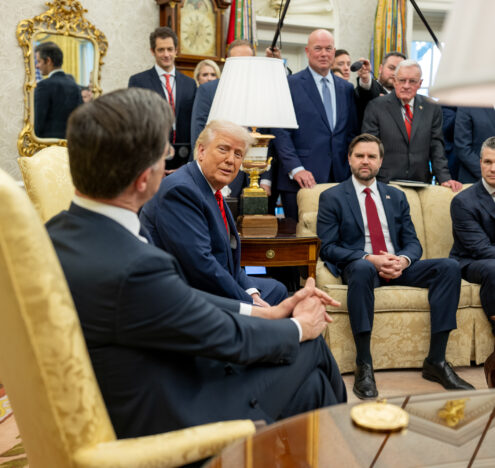With a cast comprised of American, English, French, and Canadian leading actors, camera-rolling done in Malta, South Africa, Norway, and the UK, and a grand premiere at the Cannes Film Festival in France during its opening week, Mission: Impossible — The Final Reckoning, the final installment of this quintessentially American franchise — has arguably more international fingerprints on it than any other of the films thought to be “foreign.”
But at Cannes, despite the spectacular screenings and displays of cinematic glamour, something else was largely on the minds of the present filmmakers, actors, and producers. In the halls of the White House, leaders were plotting a seemingly equally impossible mission of their own: to cut international films out of the box office.
In the days leading up to the acclaimed film festival, Trump said he would seek to impose a 100% tariff on “any and all Movies coming into our Country that are produced in Foreign Lands,” sparking immediate alarm bells across the industry worldwide. He claims these movies are killing a dying Hollywood and pose “a National Security threat.”
*
The idea has so far unearthed more questions than answers about how such a ban would work. There is no guidance yet on whether films that’ve already been made would be subject to tariffs, or if the tariffs would apply to US films shot partially overseas, films exclusively available on streaming services, or those released in theaters.
Further, “Made in the USA” is not a cut-and-dry concept when it comes to movie-making. It’s not as easy as adding a tariff to a tangible good from one country to another; filmmaking has become one of the most collaborative and globalized industries we have today.
“Film is global and easily crosses the borders of any country or culture,” Japanese filmmaker Chie Hayakawa told the AP at Cannes. She was one of many vying for the coveted Palme d’Or this year with her work Renoir.
Hollywood producers are increasingly looking overseas to film, as other countries offer financial incentives and unparalleled landscapes — befitting backdrops for the big screen. Many movies are now co-productions between two or more countries, like The Zone of Interest, a collaboration between the US, Poland, and the UK. Others that are commissioned by streaming platforms transcend geographic boundaries with no clear country of origin, like Netflix’s The Power of the Dog, a five-way collaboration between New Zealand, Australia, the United States, the UK, and Canada.
*
Besides the economic fallout of these tariffs driving up production costs — which isn’t likely to benefit Hollywood, Bollywood, Aussiewood, Swahiliwood, or any other film mecca around the globe — if countries start placing tariffs on the big screen, a cascade of cultural loss will follow.
The national security claim in Trump’s declaration swore that foreign films are “in addition to everything else, messaging and propaganda!” The United States has a history of making its fair share of propaganda on the silver screen. Even today’s US films flex soft power by aligning with US interests and persuading from the camera lens rather than through coercion at the fingertips of a government strongarm.
The idea that other countries’ films are being pumped onto American screens as a deliberate subterfuge, cloaked in artistic camera work, is misguided, the experts say — smoke and mirrors, much like the movies themselves. The threat, rather, is to the security of the arts and the expression of new ideas brought before American eyes.
International films bring a flavor of culture and conversation about the world that can’t be bought out. Movies from other countries are increasingly in fashion inside US borders, as the age of streaming has taken down barriers to accessing content from all corners of the world.
These films are fueling conversations that impact the United States, and can only be written by foreign voices. Last year’s Israeli-Palestinian Oscar documentary winner No Other Land, for example, depicted the reality of strife overseas in the West Bank as the United States contended with discussions over how to approach its role in the Israel-Hamas war. The Belgian Soundtrack to a Coup d’État, another 2025 Oscar nominee, raised awareness among American viewers to learn about their little-known past in the DRC’s origin story, which still plays out in the modern day.
Meanwhile, other stories told in film still carry significance just for the sake of exchanging art, culture, and global perspective. France’s 2023 film, The Taste of Things, poignantly highlights the primacy of food in French culture. Atlantique, a 2019 candidate for the Palme d’Or at Cannes, captures the layers of life in Dakar, Senegal, as well as social issues like gender and migration, and packages them in a beautiful, cinematic way.
Removing these stories from US theaters would cause Americans to lose a critical aspect of being human: the ability to connect with communities and cultures. Cinema is an increasingly crucial mode of cross-cultural communication in today’s global system, film scholars note. Limiting access to international voices threatens to cut the United States and its people off from discussions the rest of the world is having.
Hollywood alone can’t replicate the plethora of global stories. Filmmakers can’t tell international stories solely within the bounds of the United States. And past attempts to do so offer a warning to those who still want to try: stamping out international voices raises eyebrows when Americans are chosen to portray stories they have not experienced.
*
Aside from questionable ethics, critics say much of the appeal in these films lies in their worldwide nature. Even those we don’t consider to fit the stereotypical high-brow, foreign film bill, such as the James Bond franchise, are exciting in large part because of the global chase across different countries. They spark the curiosity of viewers who crave a thrilling caper and want to learn about the world around them. Cutting out the other countries that contribute to US movie narratives will diminish their quality and audience attention and could even damage bilateral relationships.
Such tariffs would be a challenge to implement, as they fly in the face of current trends. Movie-making is growing increasingly global. Cannes is a prime example of this, creating a space for filmmakers from all over the world — including the United States — to showcase their work to others who do and don’t share their life experiences and make deals to collaborate on the next great masterpiece.
Placing a prohibitive cost on stories told onscreen around the world confines art within arbitrary borders and silences outside perspectives. Cinema holds a mirror to how societies approach ideas and other communities, retain collective memory, and embrace worldviews. A United States without these things, which would likely happen in a world with tariffs, could unfold like a real-life dystopian film.




















